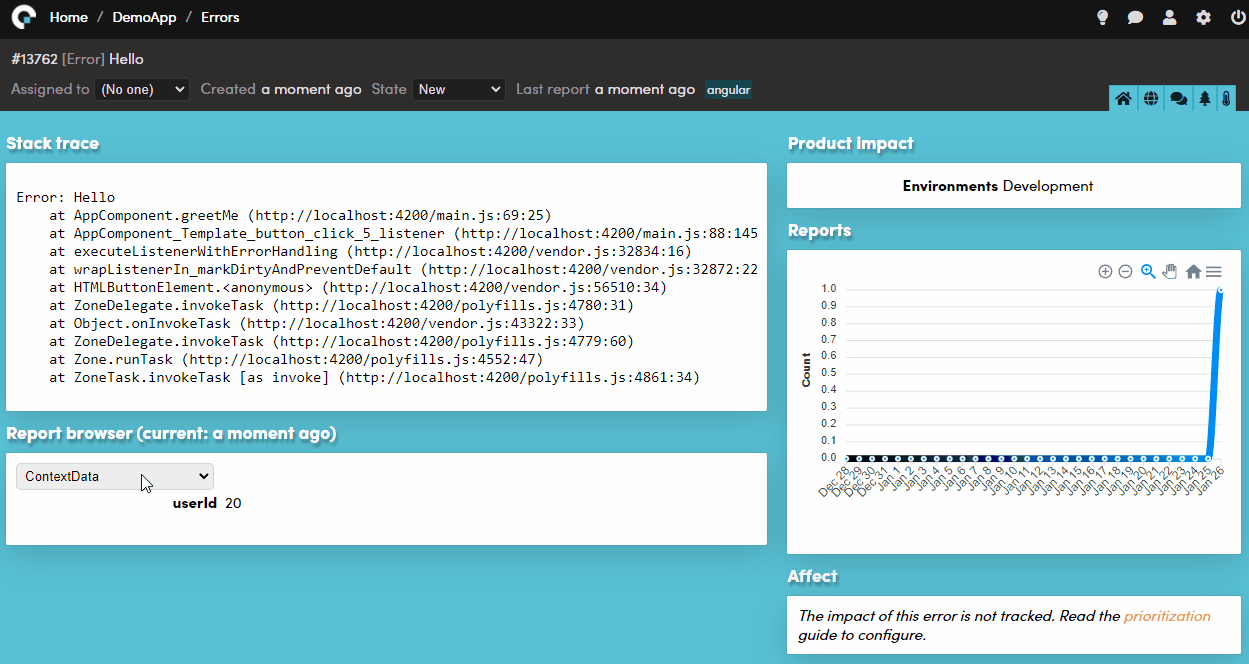Page contents
Javascript library
This library supports both browser (es6) and nodejs based applications. It can easily be compiled into IIFE to support older browsers too.
Read the installation guide for help installing the library.
Basic reporting
Once you have installed and configured the reporting library you can start reporting errors.
import { err } from "coderr.client";
try {
// do something
} catch(e) {
err.report(e, { userId: 20});
}
If that is executed in a browser based application, you'll get the following error in Coderr:

The type of information attached to an error report depends on the type of error and in which framework/library the error is detected.
Adding context data
As shown above, the second argument is used to attach data to error reports. Any type of information can be included.
err.report(e, { userId: 20, address: { city: 'Falun' }});

To include multiple sets of data, simply attach them as an array:
err.report(e, [userInfo, orderInfo]);
However, make it easier to navigate data, format the sets of data as our own context collection structure:
var collection = {
name: 'MyCollection',
properties: {
someName: 'someValue'
}
}
err.report(e, collection);

Automated reporting
Coderr can attach more telemetry and make the reporting automated. For that, you need to install one of the framework libraries, like expressjs or the angular package.
Configuration
You can adjust how Coderr handles errors. Use the configuration object to do so.
Application version
Specify the application version in the error reports. By doing so, Coderr can ignore reports for errors that have been corrected in newer versions.
import { err } from "coderr.client";
err.configuration.applicationVersion = "1.0";
Environment
Errors during development are normally not necessary to track in Coderr, as you probably are aware of most of them. To mute reporting in some environments, you need to tell Coderr which environment errors are from.
import { err } from "coderr.client";
err.configuration.environmentName = 'Development';
Once an error has been reported, mute the environment in the Coderr UI (under application settings).
Pre-process error reports
Sometimes additional information has to be added to error reports (session data, tags, priority etc). Hook into the error reporting pipeline to do that.
Another typical use case is to remove sensitive data from the telemetry.
import { err } from "coderr.client";
err.configuration.errorPreProcessor = context => {
// just an example
if (context.contextType == "DOM") {
context.logEntries = browserLogger.entries;
}
}
Filter reports
You can prevent reports from being uploaded to Coderr.
import {config} from "coderr.client";
err.configuration.filter.push({
invoke(context: ReportFilterContext){
if (context.report.Exception.Message === 'Hello'){
context.canSubmitReport = false;
}
}
});
Attaching telemetry to reports
You can add telemetry to all generated reports:
import { err } from "coderr.client";
err.configuration.providers.push({
collect(context: coderr.contextCollections.IContextCollectionProviderContext){
context.contextCollections.push({
name: 'SomeInfo',
properties: {
"Starsystem": "Andromeda"
}
});
}
});
There are different types of context classes. Each framework integration has its own. For instance, browser errors provide a DOM context where the window and the document are provided.
The context.contextType property specifies which context is used for the error that is currently being reported.